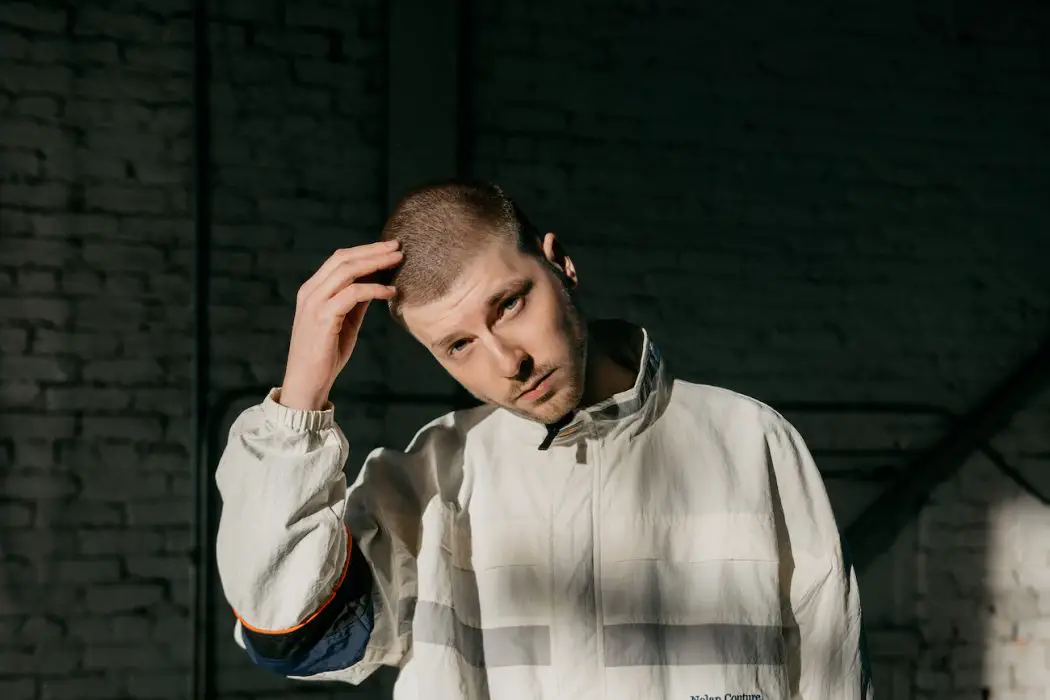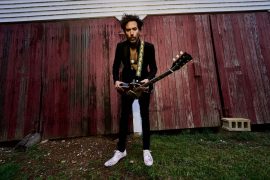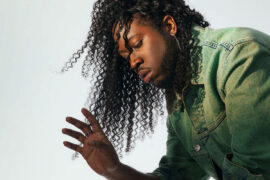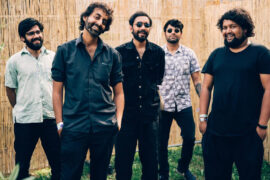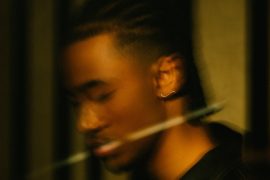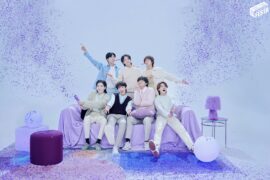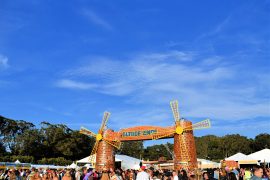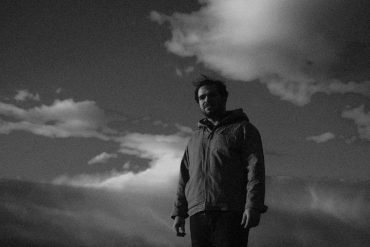Lido’s new album ‘PEDER’ finds him digging up past musical inspirations through a space-age lens.
Stream: ‘PEDER’ – Lido
When Lido’s first full-length album Everything dropped in 2015, I was a fifteen-year-old drawn to an experimentation unlike anything I had heard before — and have yet to. A couple years down the road to flash forward to today, with Lido gearing up to release his new album PEDER (released Sept 18 via Because Music), he divulges details about his own journey and creative process to put it together.
PEDER, as he describes in our conversation, is a mix of varied emotions and inspirations — music Lido was raised on and ended up returning to. He was raised on gospel and soul, received an introduction to electronic creations through the rise of SoundCloud, and has currently been diving into Frank Sinatra’s discography in quarantine.

These variations shine through on the record. On the newly released single “Layaway,” Lido sings, “I guess I got some change in store for me” throughout, that feels like a possible double meaning applicable to his personal life. Another of the earlier glimpses of PEDER from the start of this year, “Postclubridehomemusic” places Lido vocally at the forefront again (and layered at the end), while still throwing in some hypnotic instrumental shifts to pull an “Is this real?” reaction on first listen.
I don’t know why I was feeling like that
Something came over me and never came back
There are also several collaborations throughout the album, placed like easter eggs for fans and first listeners to find — including JoJo, Col3trane, and Santell, as just a few of the surprise guests. Yet, each appearance feels like a right choice. Lido explains that a lot of his collaborative choices come from friends who are creatively open-minded, leading to several songs taking shape, releasing with the artists’ project it feels better placed on.
I had seen Lido at a live show in New York last fall, when concerts still existed. Playing a mix of a few album teasers “How to Do Nothing” (and I believe, “Rise” too), the performance was just as entrancing as the music itself. Lido, be it the music videos or live concerts, always keeps a synchronicity between the sound and visuals in mind — one of the many aspects that sets his discography apart. It’s special. It’s individualistic. It’s creatively explorative and open to growth. And it’s definitely worth a listen, if you haven’t yet.
— —
:: stream/purchase PEDER here ::
A CONVERSATION WITH LIDO

Atwood Magazine: Hi Lido! How are you doing?
What’s up Lexi? I’m good.
What have you been up to?
Well, just putting out music and getting through the weird new world we live in. Quarantining, all the stuff that I feel like we’re all dealing with. Really can’t complain. Doing pretty well. I actually moved into a new house, smack in the middle of quarantine, so I’ve been doing a lot of house stuff. I’m currently sitting in my little garden situation. I’ve been gardening a bunch and cooking with the stuff that I’m growing in the garden. Yeah, very wholesome quarantine life.
Did you garden before or is this a new hobby?
It’s a bit of a new thing. I was starting to get into herbs and stuff right before I got into quarantine. But yeah, fairly new stuff now. I’m trying to branch out a little bit, get some vegetables and stuff. It’s a new world for me, for sure.
Are there any artists you’ve gotten into lately? Or even tv shows?
I’ve been rewatching Avatar. That’s been a big chunk of quarantine. I think especially as an adult, that show is just resonating very hard with me, even more than it was when I was a kid. So, thank you Netflix for putting that up. I guess other than that, I’ve been diving backwards a lot. I’ve been listening to a lot of music that I’ve always been told is really great, but that I’ve never had the time to really put a lot of effort into. I had a large amount of time where I was diving into a lot of Frank Sinatra. I’ve been listening to a bunch of Bossa nova music. Then, I’m trying to keep up with the crazy amount of music that comes out every day.
When did you first start getting into music and knew it was something you wanted to explore?
I got my first drum kit when I was about two years old. I’ve been into music my whole life. My dad was really into gospel music, so I grew up listening to a lot of gospel and soul. That’s kind of my favorite music in the world. I started writing songs when I was probably 10 or 11. I never really did much else.

Was there any specific point when you started getting into the electronic production side?
Yeah, I kind of started making friends in the US over the internet, just around the time when SoundCloud was really starting to pop off. So, through a lot of the really innovative electronic music that was happening on SoundCloud, that was very exciting to me. Probably when I was 18 or 19, I discovered all this very experimental and limitless music that was electronic music. It’s such a vague genre and that’s what I really liked about it. There’s so much freedom in electronic music. I was like, “I can do anything I want.” I think that’s what attracted me to learning more.
Do you visualize your live performances when you're incorporating the beats into the album? I just keep thinking of the synchronicity of the lights with the music of your stage setup, or even in music videos like “POSTCLUBRIDEHOMEMUSIC.”
Oh yeah, absolutely. I think very visually when it comes to music. I’m definitely always imagining the landscape. I always want everything to feel as much as one experience together as possible. I definitely imagine a lot of the music videos while I’m making the song. I’m thinking about how I’m gonna play it live and how I’m gonna do all that stuff. At the same time, when the song is done, I try to make that part feel as much as the music is possible.
There’s even the line, “I set a table for two inside my spaceship,” on “Please Fasten Your Seatbelt” and I think that’s partially alluding to your stage setup? I could be wrong, but I believe that’s what you referred to it as during the NYC show.
Yes, 100%. At the same time, there’s an underlying story to the album as well about a boy who was born on a spaceship. There’s no music on his spaceship, and he accidentally discovers music while on the spaceship. I kind of used the story about him as the outline for the album and how I made certain decisions. This album is basically what I imagined that boy on the spaceship would make. It’s kind of a little, it alludes to that as well. I’ve always felt like I’m in a spaceship when I play my live shows and I have all my toys around.
So, it was more of a conceptual inspiration than a personal one?
I do a lot of executive producing for artists, and one thing that I’ve learned is that it’s really good to have a set of guidelines. When you’re not sure what decision to make, you can kind of ask the story or you can ask a concept. Like, “What is the right thing to do here?” It very often helps you move forward. So, that was kind of the idea with that. The lyrics are still my experiences. The songs are still my songs, but whenever I was not sure what to do and how to make things feel like one experience, I would think about that story. I’d kind of try to make it parallel with that story.
Do you have a favorite lyric from the album?
Oh man, I need to think about that. Damn, that’s hard. I don’t know if I have one. This is the first time I’ve really dove into writing lyrics the way that I have. At one point, there’s a song on the album where there’s the lyric that goes, “If it wasn’t my year, would you still be here? / Or would you disappear back to the dorm of a future doctor?” It’s a song about being in love with someone who goes to school far away and kind of being like, “If I wasn’t doing well, would you just find somebody in your school who’s gonna do well in their life?” There’s tons of lyrics on the album, that’s just the first that comes to mind.
PEDER feels somewhat like a mix of a return to your older stuff (pre-Everything), and you also collaborate with Santell again. Yet, also with more of a focus on vocals and songwriting, compared to Everything?
Absolutely. I tried to let this be an album that’s so equal across the board, between all of the different genres that I love. I didn’t want it to be an electronic album with hints of R&B or a pop album with hints of hip-hop. I wanted it to be everything that I love. So, I would say there’s equal parts of the music I grew up loving, equal parts of Everything, and equal parts of the music that I was making when I was a kid. The new addition to it is definitely focusing more on experimenting with vocals and structure. I feel like on Everything, it was very much about expressing these explosive emotions. I think I, at the time, probably wanted to make music that was impressive and surprising to my peers. That kind of resulted in a lot of very surprising sounds and heavy contrast. Now, I think the biggest difference with this album is the surprises are not in the sounds, but in how the songs are structured and where the song ends up versus where it started. I try to let every single project be an opportunity to learn something and practice. That’s what I’ve tried to do on this one.
What do you feel like you’ve taken away from creating this record?
I learned a lot about myself, in terms of what I’m confident about and what I need to practice. This is the first time in my life that I let somebody else mix my music. This album was mixed by an incredible guy named Tony Maserati. Through the process of working with him, I learned a lot about myself. I think I’ve grown a lot as a musician from that experience. To be honest, this album feels more back to my roots than I’ve felt about my music in a long time. So, I feel I’ve learned a lot of new things, but I also feel like I came home and found some things that I believe is truly me.
Did you have any sort of set writing/production process for this album?
Every single song is different. A lot of songs started out as collaborations that I made with other people for their projects. The songs would take on such a crazy journey that it wouldn’t make sense for them to release it as their own music. Most of the time, I would have an idea of the outline of a song. Like, “I wish there was a song that had three different choruses in a row.” Or, “I wish there was a song that started out as really aggressive, and ends up as a really soft song by the end of it.” Or, “I wish there was a song that describes what I’m feeling in this very strange situation with the person I’m dating at the time.” Very often, it starts off as a general idea of something and then, the music comes very quickly to me. All of the production stuff happens very fast. Then, what usually takes a long time for me, is to write the words and to get all of the vocal stuff the way that I want it to be.
How did the Ebenezer collaboration, or even the JoJo or other ones come about? Did you know them beforehand? Or reach out to work together?
Me and JoJo had been working together very closely over the past year and a half. She became a really good friend of mine. And I think that was the important thing here. I wanted to work with people who had the guts to do things a little differently, but also wanted it to be people who trust me and my creative choices. Most of these collaborations are people that I really consider friends. I’ve made a lot of music for them, then eventually it came around to me on my music. We would already have such a great creative relationship, that they were down to experiment and take it a step further into my world. These are all incredible creatives. I respect them and they trust me — all my crazy ideas.
Do you have a favorite thing you’ve worked on outside of your own music?
Oh, it’s really hard. I’m very proud of a lot of the music that me and Jaden have made together. We’ve made a couple crazy songs, that are kind of four part songs. So, they’re really 20 minute long songs that are combined together. We have one, four part song called “B,” “L,” “U,” “E” and one called “P,” “I,” “N,” “K” we made together that I’m really proud of. Those were such crazy, creative journeys. That might be my favorite.
https://www.youtube.com/watch?v=6aBhu3AfOiM
What’s been your favorite tour memory?
I really, really miss touring so much. For me, each show is always a little different because I like improvising a little bit and playing things by ear. So, interactions with the crowd, taking things that the crowd gives me and turning it into something else. That communication is special to me. Just being able to meet the people that listen to my music and talk to them about it is really special. A lot of the motivation for why I release music is that. I miss shows a lot. I can’t wait to get back.
How has the livestream experience been for you, compared to live shows?
It’s cool. I’m not a person who spends a lot of time on the Internet generally. It’s very sporadic, whether or not I feel inspired to livestream. A lot of the people who listen to my music are also creative. I really love letting them into the process and playing with ideas that they also have. I respect my fans’ opinions very much, so I try to let them into the process a little bit. They’re far and few between, but always feel really special.
What aspect, if any of, Peder was the hardest to make?
I would say “Please Fasten Your Seatbelt.”
“Please Fasten Your Seatbelt” was one of those songs where I would recut the vocal, over and over and over again, and change the production every time. I had a very specific emotion that I wanted to get out. Especially getting more into singing was kind of a challenge for me, in terms of getting the vibe right. I think “Please Fasten Your Seatbelt” was the last piece that was completed on the album, because I recorded the vocals so many times.
What emotion or energy were you trying to get out into the song?
Well, “Please Fasten Your Seatbelt,” I wanted it to feel like the moment when you are down, but decide to get back up. That’s a very complicated emotion for me. I wanted some of the exhaustion and tired feeling of being down to be a part of it. Also, at the same time, be motivational and try to get myself back up on my feet, but not have it feel like I’m preaching or making “motivational” music. I wanted it to capture that moment when you hit rock bottom, or you’re really scared, or everything seems really dark, but you make the choice to take a risk. You make the choice that you’re going to get better. I wanted to have overtones of loneliness. I wanted to have overtones of motivation and struggle. I like making songs that have a lot of different types of emotions in one. That one was especially challenging for me.
Do you have a personal favorite song from the album?
There’s a song called “University” on the record. That’s probably my favorite right now. That changes pretty much every day. There’s a lot of different types of songs on the record, so it just depends on what type of day it is.
To close, if you could give any piece of advice to aspiring artists, what would you say?
I would say don’t take anybody’s opinion seriously. I would say don’t listen to what anyone else thinks, but listen very closely to what you think. The second part of that is be very honest with yourself about how you feel about your music. And whether or not you’d love it for yourself, when you’re by yourself. Just try to not overthink it at the same time.
— —
:: stream/purchase PEDER here ::
— — — —

Connect to Lido on
Facebook, Twitter, Instagram
Discover new music on Atwood Magazine
? © Michael Drummond
:: Stream Lido ::

